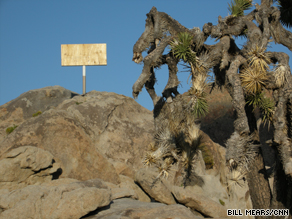MrsSpringsteen
Blue Crack Addict

abcnews.com
Justices to Decide if Memorial to WW I Vets Constitutional
By ARIANE de VOGUE
Oct. 7, 2009—
Deep in the heart of the Mojave National Preserve in California stands a five foot cross carefully disguised in a plywood box.
The U.S. Park Service was forced to cover the cross until the Supreme Court decides whether the cross can remain in its place as a monument to fallen soldiers during World War I, or whether it must come down because its presence violates the Constitution.
The case is the latest in a recent flurry of challenges to religious symbols placed on public property.
The cross was constructed more than 70 years ago by the Veterans of Foreign Wars.
It stood peacefully for over 60 years until the Park Service was asked if a Buddhist Shrine could also be built near the cross.
When the Park Service declined the request Frank Buono, a retired National Park Service employee, expressed his dismay that the government was showing favoritism of one religious symbol over another.
While Buono, a Roman Catholic, did not find the cross itself objectionable, he was disturbed that it stood on government property when the government would not allow individuals to erect other permanent displays celebrating other religions.
With the help of the ACLU Buono took his case to federal court and won. The court found that the cross violated the Establishment Clause of the Constitution which prohibits the government from giving preference to one religion.
Seeking to quell the controversy, Congress stepped in, trying to find a way to remedy the situation. Congress looked for a fine line between those who viewed the cross as a religious symbol on government property and others, notably veterans, who viewed it as a symbol of the sacrifices of fallen soldiers.
In 2003 Congress found a novel way to deal with the situation: it passed legislation to transfer the land to private ownership.
But transferring the land to private ownership did not end the problem. A federal court enjoined the transfer finding that the congressional response did not adequately resolve the constitutional violation that had occurred.
Congress Transfers Land, Cross to VFW -- Sufficient Fix?
The question in front of the nation's highest court is not whether the cross can stand on public ground a lower court found that it could not-- but instead, the Supreme Court will decide whether the Congressional remedy is a sufficient response.
Lawyers for Buono say that the proposed transfer is merely a sham and an ineffective way to try to get around the constitutional violation. They argue that although the land might be transferred to private hands -- owned by the Veterans of Foreign Wars -- the government still has too close a relationship to the cross. The cross would still be designated as a national memorial and the government will maintain oversight of the property.
Buono's lawyers write, "the land transfer does not fully remedy the constitutional violation because of the numerous ways Petitioners will continue to have an ownership interest in, and control over, the Christian cross and the land on which it is located."
But the government argues that the transfer of the land "not only will cure any constitutional violation by ending the government's endorsement of the cross," but will also show respect for the country's fallen service members and avoid "social conflict and divisiveness."
Lawyers for the government write, "By placing that land in private hands, Congress ended any endorsement of the cross."
Court to First Rule on Whether It Can Rule
Before even reaching the question of whether Congress acted appropriately, the Supreme Court will first have to decide whether Buono has the right -- or the legal "standing" -- to bring the case against the government.
The court must decide whether Buono is sufficiently harmed by the matter at hand to be able to bring the case.
The government says that Buono -- who lives out of state -- has not shown that he has been sufficiently harmed by the cross and thus cannot bring the case.
Buono's lawyers argue their client suffers during his regular visits where he must either accept the presence of the religious display or undergo burdens to avoid the contact.
If the Supreme Court finds that Buono has no standing, it may never get to the question of whether Congress succeeded in avoiding the constitutional question by transferring the land.
Veterans groups are fearful that if the Court finds against the cross, attention might be turned to other monuments.
In a brief, supporting the government, lawyers for several veterans groups write that an adverse ruling could "presage the destruction of thousands of similar monuments and memorials nationwide, collectively inflicting pain upon our brave veterans and the families of our fallen heroes."
